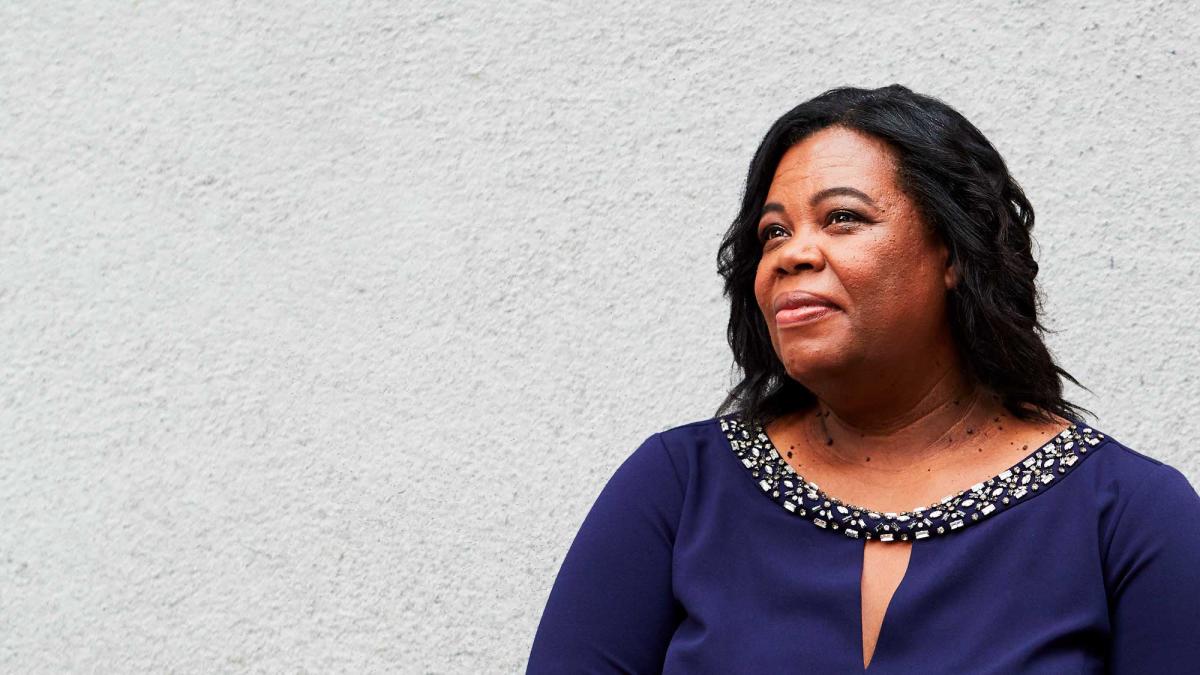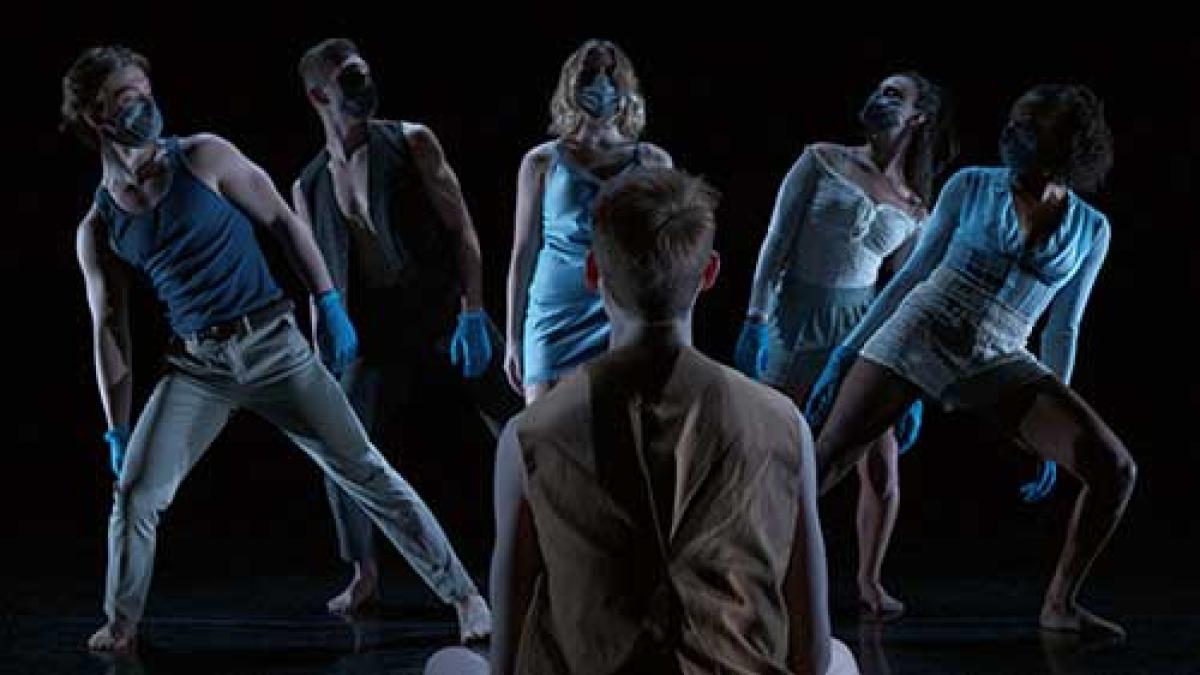Programmers won’t look like they used to. Not if Professor Pauline Mosley has her way. She’s opening the door to computer science for women and minority communities and teaching her students how to use their tech skills for the greater good. Her efforts extend from high school students in the GenCyber program she runs to advocacy and mentorship for women in tech.
Meet Luisa Morales
Luisa Morales, an MS in Computer Science student, has cultivated a lengthy list of accomplishments during her time at Pace University’s Seidenberg School of Computer Science and Information Systems. For starters, Luisa has enriched her college experience working as a graduate assistant at Seidenberg. She was also an Engineering Fellow at the Mayor’s Office for Economic Opportunity. When an opportunity presents itself to Luisa, she grabs hold of it—that’s what keeps her ahead of the curve.
Luisa Morales, an MS in Computer Science student, has cultivated a lengthy list of accomplishments during her time at Pace University’s Seidenberg School of Computer Science and Information Systems. For starters, Luisa has enriched her college experience working as a graduate assistant at Seidenberg. She was also an Engineering Fellow at the Mayor’s Office for Economic Opportunity. When an opportunity presents itself to Luisa, she grabs hold of it—that’s what keeps her ahead of the curve.
Luisa graduated with a bachelor’s degree in economics from Pace University in 2011. A few years later, she decided to return to Pace University and become a Seidenberg student to do a Master of Science in Computer Science.
She was quickly integrated into the Seidenberg community through a bridge program during her first semester. The bridge program, which is comprised of several introductory classes, is built for students like Luisa who did not study computer science in their undergraduate education. They serve to provide career changers and students looking to try something new with the fundamentals of computing so they can start taking graduate level courses with confidence. In the bridge program, Luisa took Fundamental Computer Science I Using Java, Fundamental Computer Science II Using Java, and Computer Systems and Concepts. As a Pace alumna, Luisa was able to take these courses with a scholarship - something other students may also take advantage of if they are considering a master’s at the Seidenberg School.
The deciding factor of becoming a Seidenberg student, though, was the ability to take courses for her master’s degree in person.
"Through teaching myself to code, I discovered I learn best by talking through problems with others, repetition, and compound learning. I’d tried MOOCs (Massive Open Online Courses) when I first started learning to code using Coursera, edX, and CodeAcademy, amongst others. While they’re amazing tools, they weren’t ideal for me when learning computer science topics because it required a different thinking process than I had at the time,” Luisa explains. “I would eventually lose momentum, patience, or get sucked into depressive states. Due to this experience, when considering master’s programs, I only considered in-person ones."
Her decision to study computer science through the Seidenberg master’s program came from her personal recognition of her blind spots when it came to some concepts. This led to what she defined as a lack of common core knowledge in computer science.
"It was holding me back from progressing in my career," Luisa says. "I wanted to understand how the systems I worked on functioned under the hood but was unaware of what I didn’t know. As a front-end developer, a lot is obfuscated from you, so it’s quick to build something but harder to build efficiently. Debugging is also a huge pain when you don’t understand the difference between what you’re intending your code do, what it’s actually doing, and where to start to find out."
In order to progress in her career, Luisa chose to dive into her interests in backend development. To work to the best of her ability, she wanted to work closer to data so she could find the connection between economics and computer science. While she taught herself as much as she could, it didn’t come easily.
"It took a long time for me to accept the validity of what I knew as a developer," she states. “So, deciding to embark on learning backend development felt like an opportunity to give myself the space to learn the core/common computer science concepts I felt I lacked, expose myself to new technology, learn things I wouldn’t have exposed myself to otherwise, and get a degree in the process!"
This interest made her extraordinary from the very beginning. So it’s no surprise that Luisa earned an internship working as an Engineering Fellow at the Mayor’s Office for Economic Opportunity from September 2018 to August 2019. She describes her time there as "amazing."
"It’s the first time I’ve worked in government as an engineer and is the most supportive environment I’ve been in so far," she says. "Everyone is really kind and driven to learn, experiment, and help others."
Luisa’s time at the Mayor’s Office broadened her horizons and gave her the chance to work on real programs. She explains that, as a fellow, you have the opportunity to pick a project that aligns with the things you are passionate about.
"I chose to continue a project that another fellow had built a proof of concept for. It’s a dashboard that helps our outreach team prioritize the neighborhoods they visit and determine which trainings and events to run," she explains. "With this project, I got the opportunity to decide on the system architecture, build my first REST API, run my first SQL queries, and contribute to open-source [projects]."
While Luisa spent an entire year at the Mayor’s Office, she also likes to highlight her time with Women Who Code NYC.
"I started attending events after struggling with the feeling of isolation from learning to code at home and it was hugely refreshing. I started volunteering in 2016, and shortly after became a Lead."
What has helped Luisa further her journey in tech? "Having a community where I can let my guard down and feel like I belong and my voice is heard has been key for me," she states.
Most recently, Luisa attended the Grace Hopper Conference as a Facebook Scholar where she had the opportunity to further explore the technology industry with thousands of other women. As a Facebook Scholar, her expenses—room and board, airfare, meals, and the cost of attendance—were completely paid for.
While she was "nervous but excited" to attend, she recalls that she was "really excited to learn about what other engineers are working on to give me an idea of what I can do."
Now, she’s moving on to doing more and better things. We’re ecstatic to watch Luisa thrive in this industry and to support her on her journey.
Quilting Daily Featured Dyson Professor Jay Duckworth in “The Stories we Tell, Quilt & Tell Podcast”
Jay Duckworth is the props master behind the props in Hamilton. He is a professor at Pace University and works at The Public Theater in NYC. When covid-19 hit in 2020, he witnessed firsthand the rush all sewists and quilters made to create masks and PPE as the pandemic took hold. He created medallions to commemorate the work we did to help fight the pandemic. “This Sewing Machine Fought Covid-19” will stay with your machine so future generations know what we did.
Gov Info Security Featured Seidenberg’s Dean Jonathan Hill in “Senate Bill Addresses Federal Cyber Workforce Shortage”
Echoing the statement, Jonathan Hill, dean of the Seidenberg School of Computer Science and Information Systems at Pace University, says: "As the outrage of the recent Colonial Pipeline hacking already fades from memory, it is critical that our elected officials take action to keep the shortage of cybersecurity talent on our national radar screen. The proposal to create an apprenticeship at CISA is important, but it must be matched by similar opportunities at other federal agencies, our big financial institutions as well as other private sector companies that should invest in the development of this next generation of cyber warriors."
Pace University Receives $2M Federal Grant for Nursing
Pace University’s College of Health Professions has received a nearly $2 million federal grant to increase opportunities and retention for historically underrepresented minorities in the field of nursing.

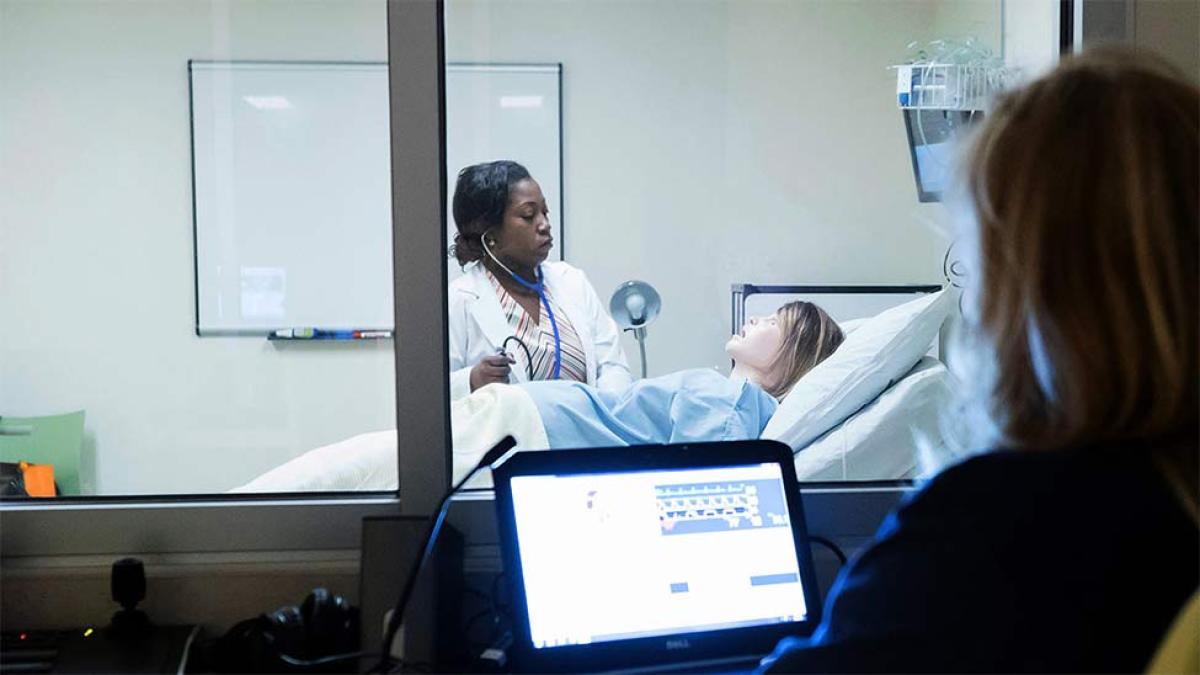
College of Health Professions' STEPS to Success Program Increases Opportunities, Retention for African American, Black, and Hispanic nursing students
PLEASANTVILLE, N.Y. (June 30, 2021) – Pace University’s College of Health Professions has received a nearly $2 million federal grant to increase opportunities and retention for historically underrepresented minorities in the field of nursing.
The prestigious Nursing Workforce Diversity grant is funded through the U.S. Health Resources and Services Administration (HRSA) and is designed to increase educational opportunities and retention rates for first generation college students from underrepresented ethnic and racial minority groups, notably African American and Hispanic students pursuing a career in nursing.
The award comes at a period when society and the healthcare sector are facing a growing shortage of qualified nurses throughout the country, which was highlighted during the Covid-19 pandemic, and is adversely affecting communities with some of the greatest healthcare needs.
“I am so pleased to see this recognition of our longstanding commitment to diversity in both our student and faculty populations,” said Dr. Harriet R. Feldman, dean and professor at the College of Health Professions and the Lienhard School of Nursing at Pace University. “In order to best reflect the populations we serve as nurses, we need a workforce of practitioners and educators from diverse backgrounds. The HRSA Award will move us closer to our goal.”
In particular, the grant will be facilitated through the College of Health Professions’ and the Lienhard School of Nursing’s innovative STEPS to Success program, which provides support, scholarships, mentoring, tutoring, wellness workshops, and resiliency training aimed at preventing burnout and promoting academic success for nursing students. The grant will be funded over 4 years.
The goal in serving this population is to provide a solution to the inequality among the race and ethnicity of nurses and the populations they serve, that, in turn, results in inequities in health care outcomes, noted Rhonda Maneval, D.Ed., RN, senior associate dean, Pace University College of Health Professions and Lienhard School of Nursing.
“Receiving the HRSA NWD grant is a significant opportunity for the Lienhard School of Nursing to build on its legacy and commitment to increasing the racial/ethnic diversity of nursing students, and ultimately practicing nurses,” said Maneval. “In general, schools of nursing are not educating and graduating nurses reflective of the ethnic and racial diversity of their home communities. This lack of diversity results in health disparities that have significant impact on health outcomes of minority populations. The grant allows us to better ensure a pipeline of diverse nurses into our local communities. The grant will also support our efforts to recruit and retain a more diverse nursing faculty. We are thrilled to have received this funding and look forward to implementing the program.”
The grant announcement comes at an exciting time for Pace University, as it is poised to transform Lienhard Hall, home to its College of Health Professions on the Pleasantville campus, into a modernized Healthcare Hub with the help of $1 million in funding from New York State. With these critical funds, Pace will add important programming for students preparing for careers in the region’s burgeoning healthcare and biotechnology sector while adding to, and modernizing, existing lab, classroom and simulation space -- all with the goal of meeting the ever-changing technology demands in the healthcare sector and preparing much needed nurses in New York State.
Additionally, it’s estimated that as many as 75,000 qualified students were turned away from undergraduate and graduate programs in the U.S. in 2018 because of insufficient space, clinical sites, and faculty, according to an American Association of Colleges of Nursing’s report.
The combination of grant funding will help Pace address a nursing shortage, particularly in the metropolitan and Hudson Valley regions, while creating opportunities for students interested in a career in health care.
“Pace University has always been about creating opportunities for its students,” said Provost Vanya Quiñones. “These funds will go a long way in helping students start a rewarding career in nursing while helping our communities provide critical care practitioners that are the backbone of our healthcare system.”
About Pace University
Pace University has a proud history of preparing its diverse student body for a lifetime of professional success as a result of its unique program that combines rigorous academics and real-world experiences. Pace is ranked the #1 private, four-year college in the nation for upward economic mobility by Harvard University’s Opportunity Insights, evidence of the transformative education the University provides. From its beginnings as an accounting school in 1906, Pace has grown to three campuses, enrolling 13,000 students in bachelor’s, master’s, and doctoral programs in more than 150 majors and programs, across a range of disciplines: arts, sciences, business, health care, technology, law, education, and more. The university also has one of the most competitive performing arts programs in the country. Pace has a signature, newly renovated campus in New York City, located in the heart of vibrant Lower Manhattan, next to Wall Street and City Hall, and two campuses in Westchester County, New York: a 200-acre picturesque Pleasantville Campus and the Elisabeth Haub School of Law in White Plains. Follow us on Twitter or on the Pace News website.
About the College of Health Professions
Established in 2010, the College of Health Professions at Pace University offers a broad range of programs at the bachelor, master, and doctoral levels. It is the College’s goal to create innovative and complex programs that reflect the changing landscape of the health care system. These programs are designed to prepare graduates for impactful careers in health care practice, health-related research, or as educators, and equip graduates to work in health policy and global health fields. Students in clinical programs receive hands-on training in the College’s interprofessional Center for Excellence in Healthcare Simulation and have the opportunity to apply their developing skills in real-world settings at many of the regions' leading clinical facilities. The College is currently comprised of several growing and important areas of study, which include Nursing, Physician Assistant, Communication Sciences and Disorders, Nutrition and Dietetics, Occupational Therapy, and Health Science. Our vision is to be recognized for our innovative leadership in education, practice, scholarship, and service to improve health and the health professions. Our mission is to educate and challenge diverse students for the health professions to be leaders, innovators and lifelong learners who will positively impact local, national, and global health. For more information, please visit the College of Health Professions website and the Lienhard School of Nursing website.
Turning Education Inside Out
The Department of Criminal Justice and Security and Westchester Department of Correction (WCDOC) joined together to complete a virtual course offering on Crime and Public Policy within the Inside-Out Prison Exchange Program, in which Pace students learned in conjunction with incarcerated students.
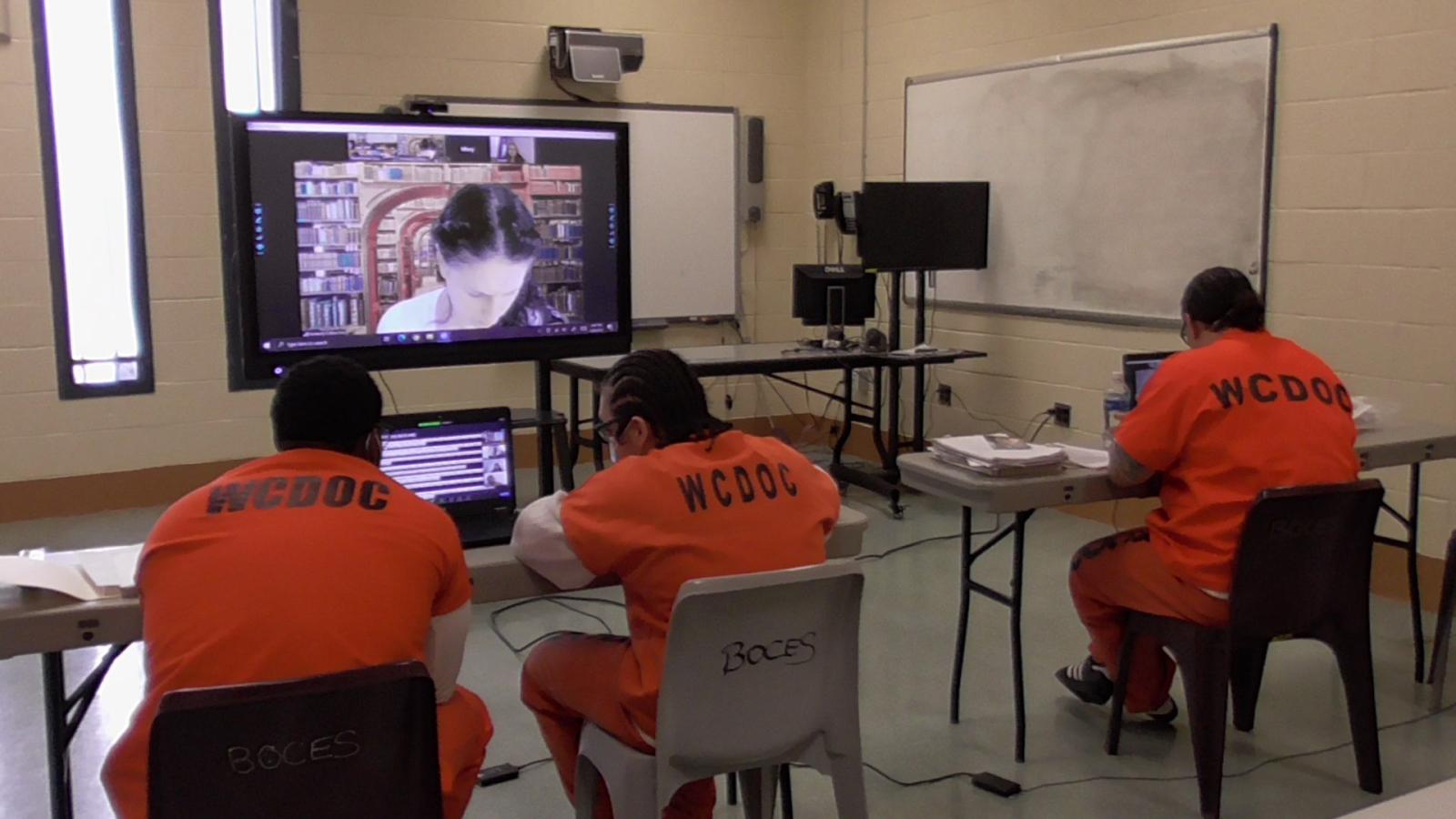
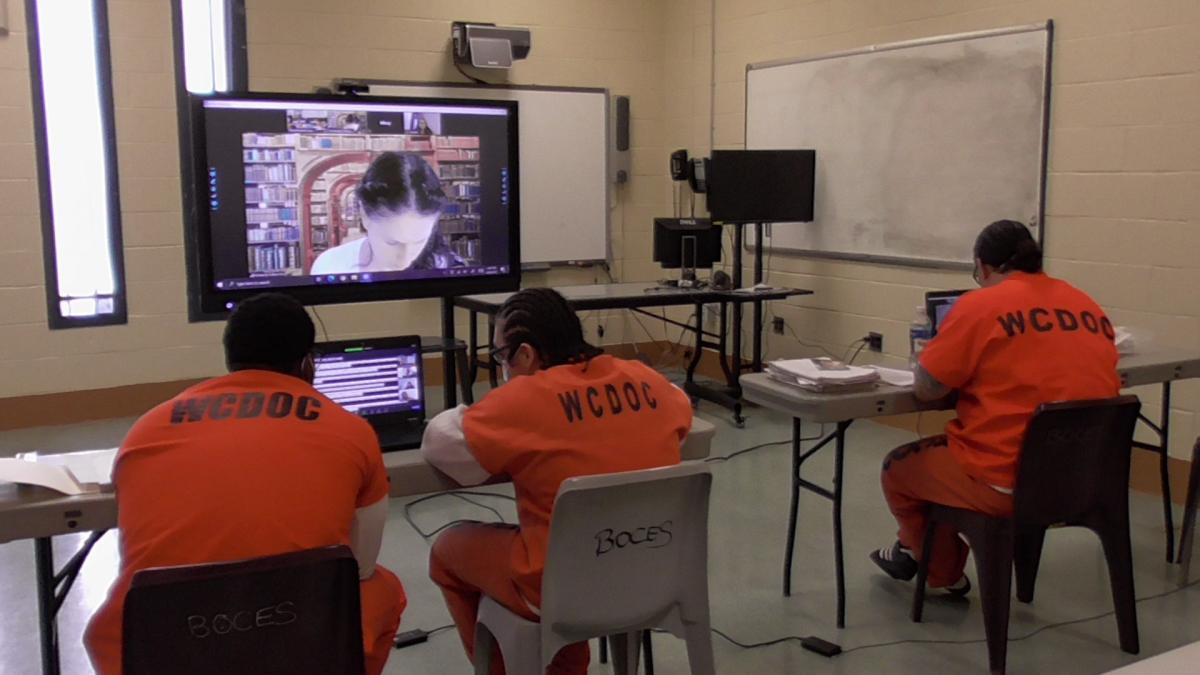
The Department of Criminal Justice and Security and Westchester County Department of Correction (WCDOC) joined together to complete a virtual course offering on Crime and Public Policy within the Inside-Out Prison Exchange Program, in which Pace students learned in conjunction with incarcerated students.
It was part of one of the very few Inside-Out programs able to operate nationally during the COVID-19 pandemic, and provided three college credits upon completion to six students from the county jail and eleven Pace students. The writing-enhanced course, which featured the use of innovative tools and secure technology, as well as donated laptops from Pace, was taught by Dyson Professor of Criminal Justice Kimberly Collica-Cox, PhD, in her second year of college programming for the WCDOC.
"We were one of the very few Inside-Out programs that was fortunate to run during the pandemic. We learned that a virtual pedagogical approach can increase programmatic opportunities for all correctional institutions, even post-COVID, if correctional staff are open to its implementation and willing to work collaboratively with outside program providers," said Collica-Cox.
Related Articles
Announcing the establishment of the Barry M. and Jackie Gosin Center for Equity and Inclusion. This new Center, established via a donation from the Gosins, supports ongoing efforts at Pace in anti-racism and equity; expands work to elevate job placement and entrepreneurship among Black, Indigenous, and people of color (BIPOC) students; and enhances academic scholarship in these areas.
In year where stage lights all across the world went dark, Pace’s School of Performing Arts found creative ways to keep the show going. Through virtual industry showcases, the actors, directors, and future show-business stars of tomorrow were able to showcase their talent to representatives from film, theater, and television through original performances that announced the Class of 2021 to the professional world.
Q&A with Denise Molina Capers '01
The focus of Denise Molina Capers' '01 career has been on supporting civil rights and equity, diversity and inclusion, and advocacy on so many important issues. In March of 2021, she was hired as the City of Somerville, Massachusetts’s first director of racial and social justice.
Your greatness is measured by how well you serve your community.
The focus of your career has been on supporting civil rights and equity, diversity and inclusion, and advocacy on so many important issues. In March of 2021, you were hired as the City of Somerville, Massachusetts’s first director of racial and social justice.
Tell us about this role and what you hope to accomplish within it.
It's an absolute honor, as it's the first position of its kind both on the East Coast and in the state of Massachusetts. There are other roles that work with diversity and inclusion, but this particular position is charged with eliminating institutional and structural racism within the
systems of the City of Somerville. A great task, and a collaborative one, because transformative change doesn't happen overnight, and it doesn't happen in isolation. It includes all the stakeholders that will be impacted by the decisions that we ultimately make.
The most important thing for me during these first days in my position is to listen to as many people as possible in the community, whether they are residents, workers, government officials, or police officers. I want to be aware of the history and story behind everything – and also hear every side of that story.
How did you become interested in this type of work and what does it mean to you?
I have a background in education, and I'm an attorney as well, so I decided to go into diversity practice because it was another way for me to serve my community and merge my love for education and helping others empower themselves.
This is actually my life’s work, because since I was little, I've noticed that our communities of color face a lot of inequities, disparities, and barriers. Involvement with a local community center first taught me about activism and advocacy, and as early as the age of seven, I would go to rallies with my parents, such as to prevent gentrification of our Williamsburg, Brooklyn neighborhood. My dad taught me to know my history, the struggles within it, and what it is I have to do to serve my community. And now, it is even more imperative for me because I have a son, and I want to leave this world a bit better for him.
What attracted you to Pace?
I applied to Pace as part of a dream. I felt that I needed a school that was going to challenge me and foster that passion I had for learning, so when they offered me the most scholarship money, it was an easy choice. And, I have to say that my experience was awesome. I forged friendships with my professors, and was really was able to be transparent in the sense that, I was a kid coming from Brooklyn, and I didn't have much money. When I wasn’t able to afford a computer needed for a class, they made it happen, and when campus living expenses exceeded my scholarships, I spoke to various deans, and they listened. I feel super blessed.
As a Dyson student, you majored in both journalism and political science, and later attended Massachusetts School of Law, becoming an attorney. What made you pursue these studies, and would you recommend a double major to students who are considering a law degree?
I felt that journalism would expose me to the world and to differences in cultures and ideologies, and political science would help me interpret, which is what ones does in law school. My focus was first, on what kind of attorney I wanted to be, and secondly, what major would help me develop the skills needed for that job. I did a double major because I was ambitious, but in retrospective, it would have been great to enroll in a combined bachelor’s and master’s degree program.
Who has been your inspiration?
My parents built me up to be a person who would not only realize the worth of working hard for something, but also of valuing community, identity, and fighting for the things that matter. Human rights, social justice, anti-racism, those were the things that they instilled in me, and I'm so very grateful. My father was aware of the importance of being in touch with my feelings, culture, and history, and encouraged journaling. My mom would talk to me about the sheer power of being a female, and not allowing people to look down on you. All of that was them building resiliency in me and pride as a Latina woman.
Do you have any advice for our current students?
The voice that I heard very clearly in my head was always my father's voice, which said that, when you wake up in the morning, make sure that you love what you're doing, and that you're serving your community. I believed what my father said to me that I'm going to be great, that I'm going to do something with my life, and that doing something with my life is not about me. It's about what I'm doing for my community. Your greatness is measured by how well you serve your community. Listen to those who tell you about your greatness.
Alumni Spotlight: Artisha Mann-Cooper ’12
ASDS alumna, Artisha Mann-Cooper ’12, forges ahead as a successful producer and entrepreneur during the pandemic. A true artist and recent New York City Women in Film honoree, Mann-Cooper is a great proponent of creating for the sake of creating, recognizing that if she had not produced her own material, she would not have been taken notice of. She also understands the frustration many have regarding moving their career forward, and to this end, has utilized her experience in both business and film to help artists find tangible ways to complete their goals as a coach and author of an eBook.
If you are passionate about achieving a dream, even in the toughest of times, pursue that dream, and you will be fulfilled.
When Artisha Mann-Cooper ’12 was growing up on a secluded farm in Charleston, South Carolina, her summers would often be spent at the home of her aunt in Maryland where she would watch with fascination old movies from the 1930s such as Smilin Through and The Wizard of Oz.
Her journey to being a successful film producer, multi-hyphenated artist, and entrepreneur today, however, initially was not a linear one. Mann-Cooper attended a local college instead of an art school she was accepted to, majoring in Economics and Finance, and heeding the advice of her mom, who was concerned for her daughter’s future security.
She continued on a traditional trajectory until the stock market crash of 2008, a time which forced Mann-Cooper to face her fears and heed the whispers of her heart from those earlier southern summers, and enroll in the MFA in Acting program at Pace’s Actors School Drama School.
“One of the hardest things I could do was to leave a stable career for my dream, but I realized that nothing is really stable. If you are passionate about achieving a dream, even in the toughest of times, pursue that dream, and you will be fulfilled,” she said.
It was the late James Lipton, creator and long-time dean of the Actors Studio program, who first awakened her interest in production. As an intern at Bravo, where Lipton’s Inside the Actors Studio talk show aired, Mann-Cooper would often shadow him and watch him make decisions for the show, as she kept a keen eye on the budget as part of her role.
His influence on the blooming artist was epic.
“I learned from James Lipton that I didn’t want to be the person looking for an opportunity, but the person who makes my own,” she said.
Inspired by a changing world and industry and having witnessed other women of color make great strides (namely, Issa Rae, creator of Awkward Black Girl, and Kerry Washington, cast in Scandal), Mann-Cooper found herself at a decision point.
One year out of ASDS, she used the only $1,800 at her disposal, which was initially intended to pay for a dress for her upcoming wedding, to instead create her own science-fiction digital series called Jayde. Mann-Cooper entered this work into the Trailer Cash Festival, which garnered the attention of a line producer with whom she associate-produced the film Sugar!, and continued to work with prolifically.
Since then, she has branched out to other roles, including production manager, writer, director, and actress, working for companies such as Nickelodeon, Lionsgate, and VH1, as well as Oscar-nominated directors and independent filmmakers.
Most recently, the coronavirus pandemic hasn’t stopped Mann-Coopers from bringing her creative projects into the world.
Goodbye, Butterfly, a thriller described by Mann-Cooper as “Lovely Bones meets Prisoners,” reached #1 on iTunes for three weeks in a row despite being released during this difficult time. In addition, she has been working on six film projects, three of which are near completion this year, and hosts a podcast, Two Legit to QT, with her best friend and fellow ASDS classmate d’Arquoia Connor ’13.
A true artist and recent New York City Women in Film honoree, Mann-Cooper is a great proponent of creating for the sake of creating, recognizing that if she had not produced her own material, she would not have been taken notice of. She also understands the frustration many have regarding moving their career forward, and to this end, has utilized her experience in both business and film to help artists find tangible ways to complete their goals as a coach and author of an eBook.
“I meet with my clients and my A-team (Artistprenuers) throughout the month and I find solutions and resources for them to complete their goals,” she said.
The cultivation of friendships has been a key element to Mann-Cooper’s success, and as she reminisces about the life-long ones she developed at Pace, she advises students to also nurture strong relationships with their peers.
“I had an opportunity to grow with fellow students and many of them have been my collaborators and champions. I am grateful to Pace for those relationships as the dream means nothing without a good group of people to share it with,” Mann-Cooper said.
NJ.com Featured Dyson Professor Kimberly Collica-Cox in “N.J. prison officers know they work a tough job, yet ‘we’re always the bad guys in the public’s view”
“Officers are assaulted, officers are sometimes stabbed, officers get into altercations and they’re out on job injuries for very long periods of time,” said Kimberly Collica-Cox, a criminal justice professor at Pace University.
